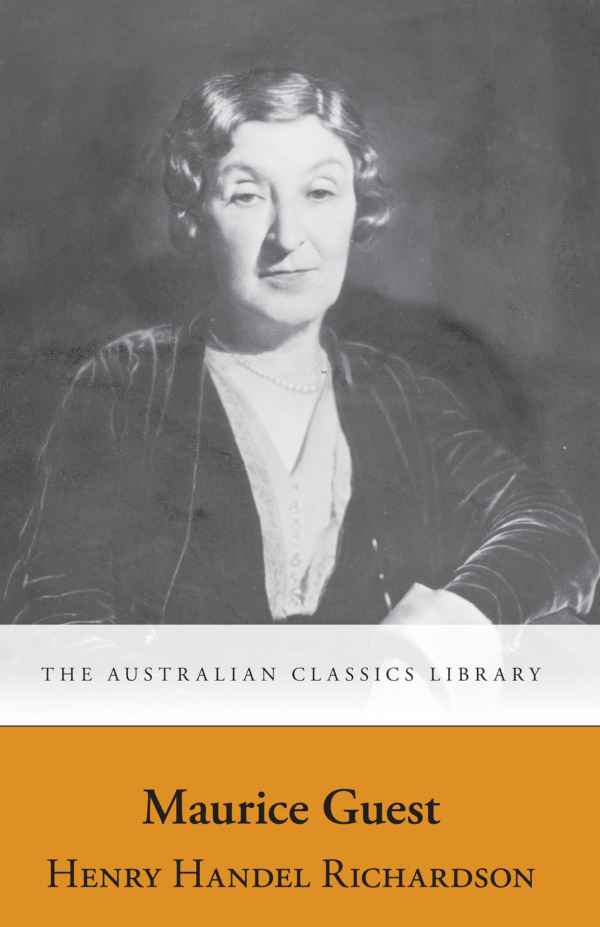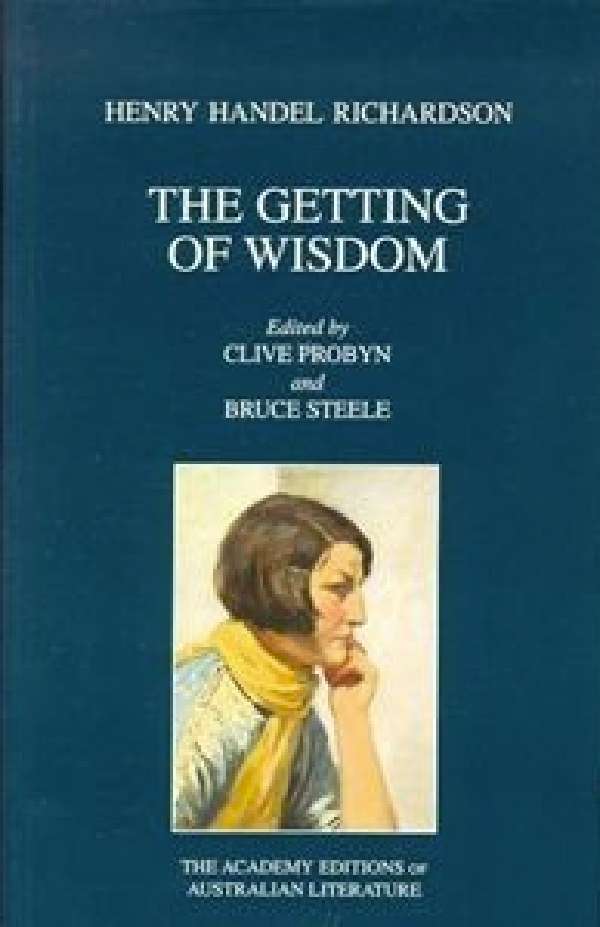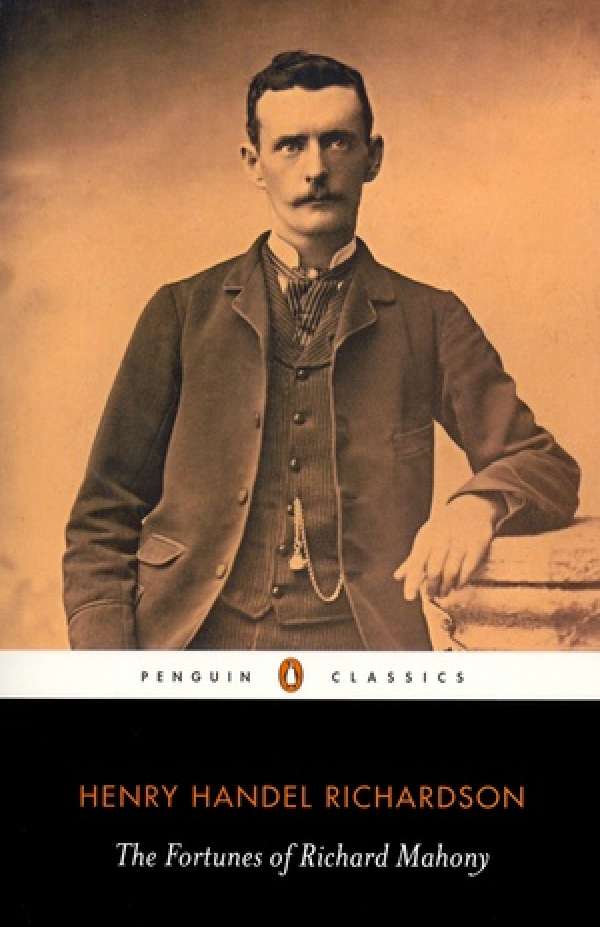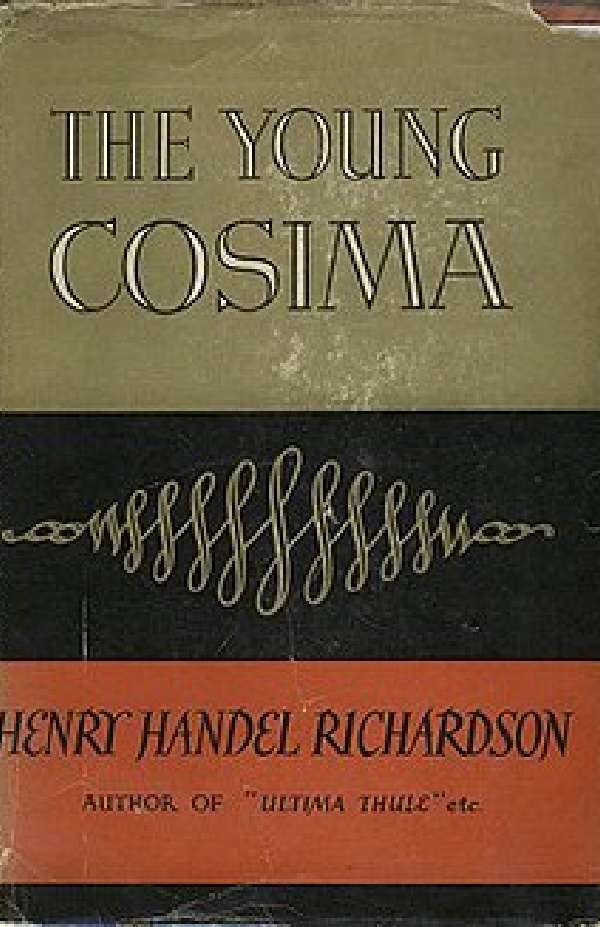Novels
-

1908
Maurice Guest
1908
Maurice Guest
‘An autobiographical novel, Maurice Guest is set in the musical culture of 1890’s Leipzig, where HHR was a student from 1889-1982.
The novel relentlessly charts the tragic progress of an erotic obsession. Its extraordinary heroine, Louise, is Australian. Its international cast of music students perform, debate, love, drink and play in the musical shadows of J. S. Bach, Beethoven, Wagner, Richard Strauss and Bizet.’ (Maurice Guest, edited by Clive Probyn and Bruce Steele, 1998)
The translation and publishing of Maurice Guest into German by Professor Stefan Welz and Dr Fabien Dellemann in Leipzig in 2019 has been an exciting development in HHR scholarship.
A celebration of the translation was held at the Literaturhaus in Leipzig on October 10, 2019, and a number of Australian and English HHRSA members travelled there for the occasion.
The first translation into German of Maurice Guest by HHR’s brother-in-law, Otto Neustatter (Lil’s first husband) was published in 1912.
-

1910
The Getting of Wisdom
1910
The Getting of Wisdom
‘This was HHR’s favourite novel – the story of her coming of age in Colonial Melbourne in the 1880’s, and of the dawning recognition in her fictional representative Laura that writing was to be her destiny. The subject of the book is a young woman: an awkward, insecure, restless and ‘knowing’ child who learns that self-realisation depends on rebellion and escape, but that the latter will first demand at least the semblance of conformity. In telling lies Laura learns both the astonishing allure of fiction and the social costs of stepping beyond the bounds of propriety, gender, class, and family ties.
The novel is only in part a personalized account of HHR’s school years at PLC, Melbourne, where (unlike her fictional counterpart) she was not only academically successful but also an outstanding student of music. Unusual for stories of school life, The Getting of Wisdom was clearly aimed at a mature readership able to understand irony and a critique of the colonial education provision of its day, including a determination to preserve sexual ignorance in young women.’ (The Getting of Wisdom, edited by Clive Probyn and Bruce Steele, 1998)
The Getting of Wisdom was made into a very successful film by noted director, Bruce Beresford in 1977. Bruce is now patron of the HHRSA.
-

The Fortunes of Richard Mahony
The Fortunes of Richard Mahony
Australia Felix (1917), The Way Home (1925), Ultima Thule (1929), The Fortunes of Richard Mahony (in one volume) (1930)
In 2010 when Australian Book Review asked its readers to vote for their favourite Australian novel, HHR’s epic trilogy, The Fortunes of Richard Mahony, was second on the list ahead of writers such as Patrick White, Christina Stead and David Malouf.
This complex work has been described as being about many things, including the difficulties of the emigrant experience, the problems of colonisation, and the quest for material fortune. Ultimately though, it is the tragic story of the spiritual and physical demise of Richard Mahony―the ‘Every man’ of the epigraph to Australia Felix. As Dorothy Green observed: ‘This most ‘naturalistic’ of novels, in fact, is a great parable, rooted in its own time and place, yet forever transcending them.’ The trilogy rests on the ‘bare bones of fact’ about HHR’s parents, Mary and Walter Richardson, with the character of Richard Mahony, fleshed out in the author’s own emotional likeness.
Australia Felix follows Mahony from his time as a storekeeper living in a tent on the Ballarat goldfields to relative prosperity as a doctor in the new town, but dissatisfied and longing for England.
In The Way Home Mahony sets up medical practice in the south of England but finds he no longer belongs in this world. News of financial ruin recalls him to Australia.Ultima Thule charts Mahony’s mental and physical decline as he struggles to support his family. It ends with his burial.
-

1939
The Young Cosima
1939
The Young Cosima
‘In The Young Cosima HHR returns to her lifelong interest in the psychological and artistic growth of the modern woman. As in the first novel, Maurice Guest, the context is the world of music. Cosima, the younger daughter of Franz Liszt, was one of the most remarkable women of her time. HHR chooses the turbulent, crucial period (1855-68) from Cosima’s engagement to the neurotic musical genius Hans von Bulow until her painful, inevitable abandonment of him in order to live with Richard Wagner. The novel ends as Cosima dedicates her life to the achievements of Wager’s artistic vision – the completion of The Ring of the Nibelung’ (The Young Cosima, edited by Clive Probyn and Bruce Steele, 2004).
Short Stories
- ‘Death’(afterwards re-named Mary Christina) in English Review, October 1911.
- ‘The Bath’, in Harper’s Magazine, October 1929. Reprinted in Best Short Stories of 1930, (ed. E.J.O’Brien), Cape, London, 1930
- Two Studies, (Mary Christina and Life and Death of Peterle Luthy), Ulysses Press, London, 1931
- ‘Life and Death of Peterle Luthy’, in Good Housekeeping, June 1931
- ‘The Grown-Up Ball’, in Good Housekeeping, November 1931
- ‘The Professor’s Experiment’, in Good Housekeeping, October 1933
- ‘The Wrong Turning’, in Lovat Dickson’s Magazine, December 1933
- ‘Conversation in a Pantry’, in Everyman, February 1934
- ‘Three in a Row’, in Lovat Dickson’s Magazine, February 1934
- ‘Substance and Shadow’, in Nash’s Magazine, April 1934
- ‘Preliminary Canter’, in The New Statesman, April 1934
- The End of a Childhood, and other stories. Heinemann, London, 1934
- ‘The Coat’, in Good Housekeeping, February 1940
Translations
- Translation of Neils Lhyne by J. P. Jacobsen under the title Siren Voices. Heinemann, London, 1896
- Translation of Fiskerjenten by Bjornstjerne Bjornson under the title The Fisher Lass. Heinemann, London, 1896
Memoir
Myself When Young -1948
In 1942, as HHR was ‘suffering from the general war-strain & war-weariness’, she put aside fiction writing for the less strenuous task of bringing to life what she described as ‘the particular small child that was me.’
She initially set out to write intimate reminiscences for a small group of readers, perhaps only family and friends. Later, she saw the work as a way to secure the narrative of her early life for a would-be biographer. Myself When Young is a set of unvarnished and lively, albeit not always reliable, recollections.
HHR brings to life stories of early family life in various Victorian townships, schooldays at PLC, time as a music student in Leipzig, and marriage to John George Robertson in Dublin in 1895. HHR continued working on Myself When Young throughout her final illness, until her death in March 1946.
Olga Roncoroni wrote a short ‘postscript’ to HHR’s work based on notes by J.G. Robertson and faithfully prepared the book for its publication in 1948. (Rachel Solomon)
Articles
- ‘Music Study in Leipzig’, in The Lady, June, 1985
- ‘The Schubert Centenary’, in The Speaker, January, 1897
- ‘Ibsen in Translation’, in The Speaker, July, 1897
- ‘A Danish Poet’, [on Jacobsen] in Cosmopolis, November, 1897
- ‘The Magic of the New Concert Room’, in Radio Times, May 1929
- ‘The story of Wagner and von Bulow – and the woman behind the music’, in Radio Times, August, 1930
- ‘Some Notes on my Books’. Article in Virginia Quarterly Review, Summer, 1940
- A Short Autobiographical Sketch in Twentieth Century Authors (ed. Kunitz and Haycraft), H. W. Wilson, New York, U.S.A., 1942
Music
-
Henry Handel Richardson Project In the 1990s all her known songs and music fragments came to the Henry Handel Richardson Project at Monash University. In 1999 they were edited by Bruce Steele and Richard Divall and published in two volumes by the Marshall-Hall Trust: 26 pieces to English poems in Volume 1 and 31 in German and other languages in Volume 11.
Soprano Vivien Hamilton and baritone Lucas de Jong have recorded a selection of her songs from English and German poets. The CD is available from Presbyterian Ladies College in Melbourne.
- Christmas Carol: Christkindleins Wiegenlied. Shenval Press, London, 1931
-
HHR’s Musical Career We do not know when HHR began to write songs, but she was encouraged in her efforts while at school at PLC (1883-7). In her first years at PLC as a boarder, home was still the Post Office in Maldon. She said she carried the words of a poem around in her head and soon a melody suggested itself. Three of her songs were performed at school concerts and reviewed very favorably in Melbourne newspapers. Unfortunately, none of them has survived. She did not write the words of her songs but set poems she knew and liked to her own music.
She continued to write songs in this way for the rest of her life. She studied music at Leipzig Conservatorium, where she met her husband. While they were living in Munich and Strassburg, she composed many little songs to German poems. Only one of her works was ever published – a little German Christmas Carol - Christkindleins Wiegenlied - appeared in a limited edition from the Ulysses Press in 1931. It was a facsimile of her manuscript and beautifully bound in individual Javanese paper covers.
Her music was for her own enjoyment: she said she found it a relaxation from writing. However, towards the end of her life, she asked her friend Olga Roncoroni to keep her manuscripts perhaps with a view to their publication.
-
Christkindleins Wiegenlied – a special gift from Germany When Christkindleins Wiegenlied was published in 1931 HHR signed 250 copies, 50 copies being kept for private distribution, and each had a unique Javanese style of binding. One of her own copies, inscribed in pencil to her husband, John George Robertson, was inscribed using their nicknames for each other (just seventeen months before his death in 1933): ‘For Nub from Pif.’
This copy remained in the HHR estate, passing from Olga Roncoroni to HHR’s literary executor Margaret Capon. On 21 May 1992 Margaret Capon of Bexhill-on-Sea presented this copy to the world-famous novelist, the Lyme Regis author of The Collector, The Magus, and The French Lieutenant’s Woman, John Fowles (1922-2004). He was the curator of Lyme Regis Museum from 1979-1988 and had moved to an impressive house in the town called Belmont in 1968, where he was evidently compiling an ‘archive.’
Professor Stefan Welz, from Leipzig University, who recently completed a translation into German of Maurice Guest with Fabian Dellemann most generously presented this fascinating copy of the carol to the Society. It carries the bookplate of John Fowles.
-
Performances of HHR’s music HHR’s music has been performed at a number of the Society’s events in recent years. In June 2018 at the annual oration at PLC one of the students at the school sang a HHR song, accompanied by a member of the school music staff.
In August 2018 the Little Choir from Trentham conducted by Val Goodwin sang a number of HHR’s songs. Four of the songs were poems by G.K. Chesterton, Walter de la Mare, Thomas Hardy and Rudyard Kipling, set to music by HHR. There was also an Irish song and a Lullaby, including a duet in German sung by Val Goodwin and Robert Franzke. The Little Choir performed more of HHR’s songs in 2019 at the annual oration held at PLC.
